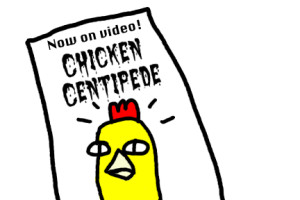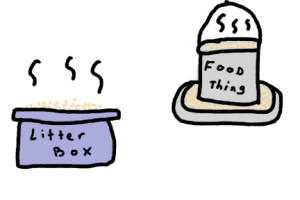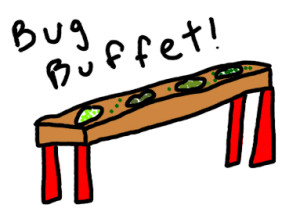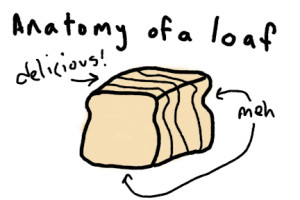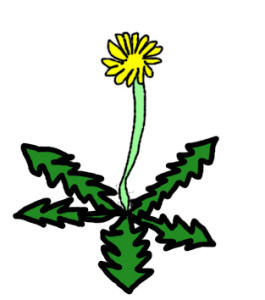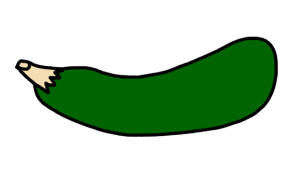What Are You Feeding Those Things?
Friday, November 15th, 2013(Broadcast 11/15/13)
Thanksgiving is quickly approaching, which means it’s time for two things. The first will be the beginning of news reports about people burning down their houses while trying to deep-fry a turkey, and the second will be the features on the horrors of the Turducken, which you may or may not know is a chicken stuffed into a duck stuffed into a turkey. These two things have become as much a part of Thanksgiving as anything else. I will not be eating a Turducken, nor will I be eating my chickens for Thanksgiving. I’m certainly not stuffing them into each other to make a Chichichichichichicken. No one in our household eats anyone else, and I aim to keep it that way. However, with the talk of what everyone’s having for Thanksgiving, it’s gotten me thinking about what I feed the chickens and how that changes with the seasons.
There are a few constants. I always give them “layer feed,” so they have plenty of that if they want it. It’s basically corn pellets with vitamins added, though you can get it in “crumble” form, which looks like someone stepped on the pellets. It’s more a tiny nugget thing, whereas pellets are obviously pellets. I have a feeder hanging under the coop, so they can pick at this stuff any time they want. An interesting thing about layer feed is that it’s basically the same stuff as some types of natural corn-based cat litter, but way cheaper. A few times in a pinch we’ve dumped some chicken feed in the litter box and gotten decent results. Though, I don’t recommend giving it to the chickens after you’ve done this, no matter how mad you are at them.
In the warmer months, the chickens can feast to their heart’s delight on bugs and worms and anything they can dig up out in the yard. Of course, in the winter months, there are a lot fewer of these things to choose from. We did just go through a Wooly Bear caterpillar explosion, so maybe they loaded up on those, and aren’t feeling too snacky right now. I don’t think that’s likely. They’ll always eat something else, and they’ll spend hours digging around in the leaf litter at the edge of the yard in the hopes of a treat no matter the time of year. Even it’s buried in snow, which I’m sure is not far off. It’s not the super buffet it used to be, but they must be finding something in there, or they wouldn’t keep at it, right? Maybe they’re just eternal optimists.
They’ve been getting a lot of bread ends lately, as my son generally is sent to school with a sandwich for lunch, so we go through a lot of bread. No one likes the ends, except the chickens. I would offer the ends to you if you like them, but the chickens called dibs. Greens from the garden have just dried up, but the bread ends will continue. We do eat other vegetables through the winter, but probably not as many as we had growing, so the flow of veggies to the chicken run has slowed. The bread ends are forever though. At least until my son realizes he can complain about what we’re feeding him. Hopefully that’s a little ways off. We’ve been getting good mileage out of this whole sandwich deal.
The newest addition to the chickens’ diet is yogurt. There’s a lot of information out there that much of our health may be influenced by gut flora, even mental health. I want to make sure the chickens aren’t feeling depressed in the winter months. What makes me depressed is when they get vent gleet, aka “nasty butt disease”, and yogurt can go a long way towards preventing that. Every morning I put a bowl of yogurt out for them, and they go nuts for it. One morning, as a test, I put a cucumber next to the yogurt to see which they would go for, and not one chicken touched the cucumber until the yogurt was gone. It’s also hilarious to watch them eat it, as it tends to get all over their faces, and they chew it with their little beaks. So it’s good nutrition as well as entertainment. They just get the plain stuff. No fruit on the bottom, fruit on the top, or memories of fruit from a summer program you were in back in college. The cheap stuff is the best. The chickens don’t even care what kind it is, they just dig it.
In the colder months, the main thing they lose is some of the variety of treats they can forage on their own. They still get plenty to eat, and if I’m worried about it, I can spend vast amounts of money at the feed store buying all sorts of other treats for them. I think they’ll be fine without tons of treats. Waiting will let them build up their appetite for ticks and ants, and at the first sign of spring, I will release my chicken fury on the insects of the yard with renewed vigor.
